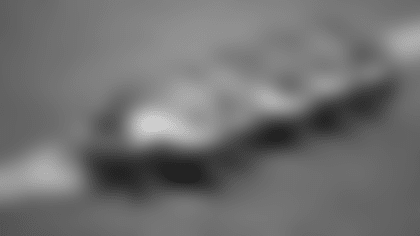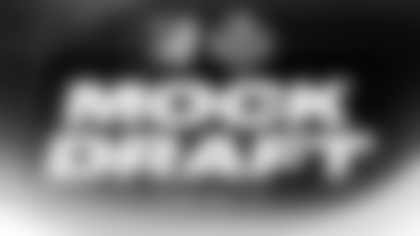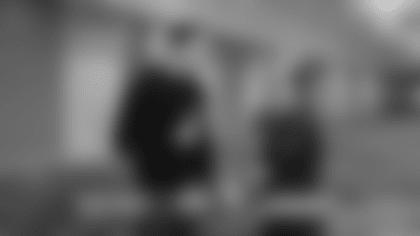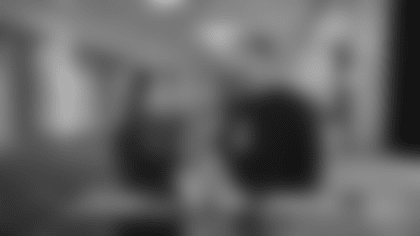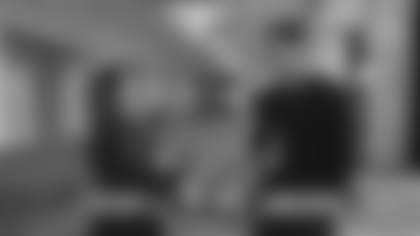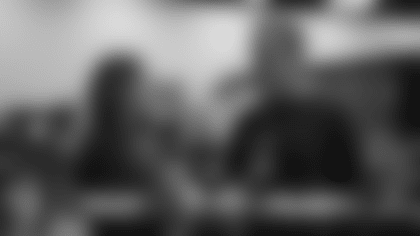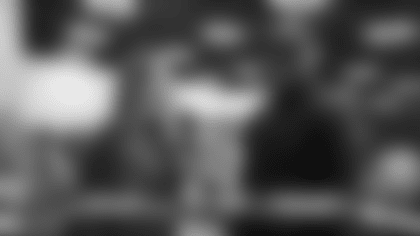Vikings Offensive Coordinator Norv Turner
Q: Are you excited to get Kyle Rudolph back this weekend?
A: Yeah, I think, number one, having the week off our guys have energy, they're fresh. We've had good practices. I thought yesterday was outstanding and then getting our guys back, slowly, getting Kyle back, if he plays that's a bonus.
Q: If Kyle Rudolph does play, do you look to slowly work up his snap count?
A: I think it's what he's able to handle. We've got a little chemistry going, a little rhythm with Chase (Ford) and Rhett (Ellison), so if guys make plays you want to continue to give them opportunities and then you want to give Kyle an opportunity to make plays.
Q: How important is it for your offense to have three tight ends available?
A: It helps. The thing it does, it takes some pressure off of Rhett (Ellison), Rhett has been playing about 50 plays a game and still playing on special teams, he's kind of been an unsung guy for us in terms of what he's done in the run game, in protection and then being able to contribute like he did last week with the catches he did, particularly in the red zone, that all adds up. He is really playing at a high level.
Q: What attributes do you credit to Teddy Bridgewater's ability to lead 4th quarter comebacks?
A: I think, number one, understanding the situation and knowing what they do as much as what we do. Teams tend to play certain things in the 4th quarter and they tend to play certain things in the 4th quarter when they're trying to hang on to a lead. We've been in that situation and if you understand what they do first, then it gives you a chance to execute what we're trying to do, and then everyone has played well in that situation. You look at it, we haven't turned the ball in that situation, we haven't taken sacks in that situation, I don't think we've dropped the ball in those circumstances. I think it's a group thing, there's a sense of urgency, but there's no question Teddy doesn't get too high or too low, it allows him to operate and continue to function in a normal manner in those situations.
Q: What does Kyle Rudolph bring to the table?
A: He brings a complete package, he can block, he can run, he can catch. He's got the experience, I think he's got a good understanding of what we do. Obviously, the better the player is, the better chance you have of having success.
Q: What has been your experience with two-tight end sets?
A: Two-tight end sets? We've been in a lot of that. I don't see us going in and playing a lot of three tight ends. The thing that's happening now, when we spread the field, we tend to have more success than when we play in tight groupings. We've done a good job spreading the field with our 12-personnel or our two-tight ends, two receivers. Our 11 personnel, with three receivers in the game has given us opportunities to spread the field a little bit.
Q: What do you think the key has been to improving the offensive line play lately?
A: Like I've said, when you get behind in games, it happened to Chicago last week, it happens to different teams, it happened to Green Bay down in New Orleans, it happens to good teams. You get behind and you're throwing every down and they're giving you every pass rush stunt, everything they have, it's hard to protect. I would say over the last period, we've been in games and we've been in games where we've kept it a normal game where they have to respect the run, the pass, the screens, the complete package and you're not down by three scores and throwing the ball every down. I think we've played better, also. I think we're playing with better consistency, I think Teddy is doing a good job of getting the ball out quick, making good decisions, he's throwing the ball away, there's a lot of things that contribute. And the two teams we've played, Tampa and Washington are not of the caliber of Detroit and Buffalo and Green Bay, those teams we're talking about in terms of the way they rush the passer. I think every week is a new test. Chicago has good pass rushers and I know that everyone's looking at the way they played the last two weeks against New England and Green Bay, but when you put them on tape against some other teams, there is a lot to contend with in terms of pass rush and the things they do with their front.* *
Q: Do you think Matt Kalil is starting to trust his knee more than he did earlier in the season?
A: I would never say that he didn't trust his knee, so I don't know how to answer that. He's playing with more consistency. He's got a better base. I think we're helping him, I think we're helping him by getting the ball out quicker. He's had some different matchups, so there's a lot of things that go into that. He has been very productive over the last three weeks.
Q: Have you made an effort to give him additional help in pass blocking with tight ends or running backs?
A: I don't think we have in the normal sequence of games, and like I'm saying, we have not been in the situation we were early where he's playing against a Pro Bowl type player and you're down by three scores. They know you're throwing, if you leave too many guys in to help in protection you don't get anyone open. There's a lot of things involved, but I do believe he's continued to be more consistent in the way that he's playing.
Q: Have you put more of an emphasis on the deep passing game in practice?
A: I'm not as caught up in the struggles as people talk about. You don't get that many opportunities in a game. The first throw everyone talks about down the middle to Greg (Jennings), that's a tough throw on the first play of the game. I know what Teddy (Bridgewater) was thinking, he wasn't going to have something bad happen and the angle that Greg set wasn't a great angle to throw, the backer was a tall guy. The deep ball down the sideline to Cordarrelle (Patterson) was just a communication deal. They busted coverage so he (Cordarrelle) stayed up the sideline and Teddy thought he was going to the post and then when he saw him, he just overreacted to it. I don't worry about Teddy's ability to throw the ball deep, I see it every day and I think he is capable of being an outstanding deep-ball thrower. There's a lot of things involved to it. Early, we didn't get a lot of opportunities to throw the ball deep in games. We're doing a little bit more now. I think in time we will not have to have this conversation.
Q: Will Teddy Bridgewater have to do anything different in colder weather with the way your offense runs?
A: Coach Zimmer and I were laughing about it, everybody talks about this cold weather. As you know, a lot of my career I've been on the West Coast, whether it was with Jim Everett when we were with the Rams or when we were with Philip Rivers and we would practice on Friday morning and it would be about 80 degrees and guys would be sweating and we would come back here and play the Giants or go into Cleveland or go into Philly and we'd go throw for 300 yards and win the game. No one talked about worrying about the cold, you just went in and you played. The cold isn't the issue. When it starts getting windy, when it starts getting real wet, when the footing gets bad, I think those are the things that are tough. If it's just cold like it is outside, I think you can go throw the ball and throw it at a high level.
Q: What is your sense of how Teddy Bridgewater has handled the wind so far?
A: His ball cuts through the wind pretty good, I don't see the wind being a problem. When we've practiced out here he's thrown really well, particularly when the wind was at his back. It helps all of those guys, I haven't been around a guy that is great into a strong wind, I don't care how good they are. I think first of all, it starts with your mindset and I don't think there are a whole lot of things that are going to affect Teddy mentally. If you don't let it affect you mentally, you go out and compete with the situation and you adjust to it depending on how bad it is.
Q: How do you feel about the continued efforts to be creative and get Cordarrelle Patterson loose?
A: We're working at it. We completed 26 balls the other day (against Washington). I don't care who they go to, to be honest with you. If you're 26-of-42, then the quarterback is doing something right, you're protecting the quarterback pretty good and guys are getting open. I think as we continue to go, Cordarrelle will get his opportunities and we will get better at them and he will start having more success.
Vikings Defensive Coordinator George Edwards
Q: What did you see during the self-scout over the bye week?
A: Well I think the biggest thing was trying to go back to the certain situations within the game to figure out what our strengths and what our weaknesses were to sort of clean up some things technique wise, some things that maybe we're playing better than we're not, spending time on things that we are probably playing not as well. So from that aspect of it, it was good to go through those things whether it was working with the run or working with the pass, working third down, working red zone. So we were able to go through all of those situations and kind of come back and hone back in on the fundamentals and the techniques that we're using by coverage, by call, in those situations. It's been a good process for us to go through those things again.
Q: Did guys seem pretty receptive to the feedback that you've given them?
A: Yeah, I think the attention to detail to those things kind of helps them understand a little bit more specific of what we're trying to get accomplished in those situations. So from that aspect of it, they've come in, they've adjusted to it, we had some practice last week to work on those things and coming back in and bringing those things to light in our preparation.
Q: How does Harrison Smith rate in terms of intelligence?
A: Harrison does a great job of communication on the back end recognizing different formations, getting us checked into the right thing so he's done an outstanding job of that thus far this year. So from that aspect of it, we feel like he can recall things. Sometimes you see them going into a game or you practice them going into a game and other times you don't, but he's been able to get us in the right calls and the right leverage in our coverages and those kind of things.
Q: Who are some of the other smart safeties that you've coached in the past?
A: There's been a ton of them. Back when we were in Dallas with Zim we had George Teague and Darren Woodson, Brock Marion, a lot of them through today just different places I've been. I can't name them all. Each guy is a little bit different and when we had [Chris] Crocker in here, who had been in the system for a while and was familiar with the system. I was with Crocker in Cleveland so it kind of carried over from there. From that aspect of it there are a lot of guys that we've been used to or had in the past that have done an outstanding job of communication. Harrison does a good job of paying attention to the details, getting us in the right call. Everybody is comfortable, there's no panic knowing that we're going to get in the right call, in the right defense, to line up and execute the call.
Q: When you evaluate the defense how do you assess the way Robert Blanton has performed this season?
A: Robert has done some good things. He made some big plays; he's gotten his hands on the ball, made some interceptions, those kinds of things. The biggest thing we're trying to preach, not just to Blanton, but everybody is the consistency part of it. The big thing as it boils down to when you get in position to make a play, to make a tackle, those kinds of things; we've got to count on everybody being accountable to each other to be able to make those tackles. I think you can see he's come a long way from when we started this thing in the offseason. I think he understands better what we're trying to do call-wise, what we're trying to do systematically. He's another one that does good job with the communication, there's no panic with him back there, and just working on the different things whether he's playing down or whether he's playing in the middle of the field just getting him acclimated to the different things we're asking him to do.
Q: Who are some of the guys that are the biggest film watchers on their own?
A: Well you can take the defensive backs and the linebackers. I looked at it yesterday and today was going to be our big third down day. Well they stayed after yesterday just to start watching the third down together to see what it is we're going to call and how it's going to fit up versus the routes, those kinds of things. I think guys are putting in the time. I know Chad [Greenway] works his butt off at it. You can just tell by the questions that the guys ask. I think Xavier [Rhodes] has done a good job learning how to study and doing those things. I think that's a part of each meeting room that guys have pressed upon. I think our defensive line, understanding what we're trying to do pass-rush wise, understanding that to get to pass rush is a privilege so we've got to go stop the run first and then we can get into attacking what they're trying to protection wise. I think it's a culmination of each group getting together and watching tape together, communicating with each other, what they're seeing, what they understand, what we're trying to get accomplished and what we're trying to teach in the classroom and then they will transfer it over to the field. I think collectively we've got a good group of men that understand that that's a big part of it that you can't see everything during the course of the week. You've only got so many reps so you've got to get in the film room, you've got to talk amongst each other formation-wise, pass set-wise, run-wise, all of those types of things as far as tendencies that we have going into a game. I think they've all bought into that in their preparation from week to week.
Q: Were Blanton's inconsistencies tackling mainly in the run?
A: Well I think it was being more familiar with what it was specifically that we were asking him to do. I think he's done a good job in the open field tackling. I think as a secondary we've done a good job in the open field tackling. We'll have a big test this week but I think guys understand that schematically when we get in a position because we're such better matchups, when we get in a position to make a play, we have to make that play otherwise it could be a while before someone gets to it. From that aspect of it, I think understanding the technique and the fundamental of his position, getting lined up properly where we want to get lined up, understanding where his eyes need to be and the breakpoint on different things. I think he's made strides as we've moved through this part of the season.
Q: How much do you get caught up in the matchups between shorter cornerbacks and taller wide receivers?
A: The biggest thing we're trying to do is get them acclimated to what they're trying to do schematically against us. Yes, the height and those kinds of things with those receivers occur from week to week but we've played teams with big receivers before like Atlanta. The biggest thing is understanding the leverage and the technique that we're trying to get accomplished through the call in certain situations. I think that once they understand that and what the offense is trying to do them, we can kind of use that to kind of help them from situation to situation. So from that aspect of it, yes, you worry about the height, weight and speed of these receivers and how much they are pushing off and all of those kinds of things but at the end of the day, if we play the technique, get our eyes where they need to be, do our footwork properly, we should be in pretty good shape for what we're asking them to do schematically.
*Q: Is there a different technique that a guy like Captain Munnerlyn would have to do differently compared to a taller cornerback like Xavier Rhodes in jump-ball situations? *
A: Yeah, he's going to have to jump a little bit higher. But no, from that aspect of it, it still boils down to the leverage and the technique and the fundamental of what we are asking him to do.
Q: Do you foresee using a sub package with Anthony Barr on the defensive line again given how well he's played at linebacker?
A: It just depends on the situation from what we think is the best matchup from week to week. From that aspect of it, that's what we look at as we've got some guys we can institute in that can do some different jobs. Like we were talking during the season, once we find out the skillset of a player, we try to get them in the most advantageous position. From that aspect of it, we're just trying to use that from week to week to see what our matchups are whether it's pass rushing or playing the run or whatever it is.
Vikings Special Teams Coordinator Mike Priefer
Q: What did you see over the bye week self-scouting your group and what did you take away from that?
A: The biggest thing that I took away from our self-scout study from that week we had, and we had time to do that, was that right now I think we're an average special teams unit. We've played solid at times. We haven't really hurt our football team and we haven't really helped our football team, not to the extent that we've done that in the past. I'm not disappointed in where we are at but I expect a lot more from our guys and I've told them that this week that we're not an average group – we've got good players, we've got good returners, we've good specialists – but we're right now we're playing at an average level and that's, to me, unacceptable. Going forward that's my challenge to our guys, that's my challenge to myself to make sure that game plan wise, fundamentally, technique-wise that we're doing the things necessary to play at a higher level.
*Q: It seems like both Cordarrelle Patterson and Marcus Sherels haven't been able to get free as much in the return game. Is there anything you can point to and say here's the reason why? *
A: First of all with Cordarrelle people aren't kicking to us as much as they have in the past when he was a younger returner in the first few games last year and then people started kicking away from him. That's going to limit the opportunities, number one. Number two there have been a lot of touchbacks this year. Number three he had a huge return again Green Bay game, the first Green Bay game, early in the game that was called back because of penalty. Marcus has had three or four really nice returns, explosive returns, that were called back because of penalties. Those were the points of emphasis, and they have been all year, especially since we started having those penalties earlier in the year. That's been our biggest point of emphasis is playing penalty-free football, playing great fundamental football, using our schemes to our advantage, maybe Cordarrelle making some better decisions to bring it out of the end zone or not out of the end zone. We have to improve there as well.
*Q: With losing some veteran guys on special teams, does that hurt you in protection? *
A: I think in any sport when you lose an experienced player at any level in any sport you're going to have some growing pains but with special teams, as we've talked before, you're going to come to expect that. Going forward we've just got to make sure these guys, and I've already told them they're not rookies anymore, they're veteran special teams guys. They've got enough snaps under their belt and now we've got to make a difference for our football team.
*Q: Do you think that Cordarrelle Patterson is too anxious to break the big one? *
A: Probably and being young. Actually I'm kind of too anxious, too. I just want him to get a return to cut it loose but yeah, sure, I would think so.
*Q: Is he making the right reads in your opinion? *
A: He's making the right reads on the return, yes, once we get going. A couple of decisions bringing the ball out of the endzone, that's partly my fault because I've coached him to be overly aggressive and partly a couple of times it's been his decision that you know he probably should have kept those in. The one our last game, Washington, went out to the 10-yard line, going to his right, catching the ball, going over his shoulder, it was a great job of getting to the ball but let's take a knee there and I know he's learned from that and he's going to continue to learn as he gets more and more experience.
*Q: Is there a way that you can game plan for them to not kick to him whether it's a squib kick or something? *
A: Well that's the thing about our formation that we use. We defend the whole field and I think we're pretty good at doing that because we expect people to kick away from him. Whether he's kicking to Matt Asiata or he's kicking to Rhett Ellison or he kicked it to Marquis Gray that one. Going forward that's how we're going to continue to defend the whole field and when they kick it deep and he's got an opportunity to bring one out, we're going to bring one out and hopefully get a big play.
*Q: With Jabari Price and Antone Exum Jr. out against Washington was that because of the special teams thing that you were talking about? *
A: Absolutely and hopefully they've learned their lesson and we can move forward.
*Q: Will they get another opportunity moving forward? *
A: They will and of course as you guys know it's not my decision on the game day roster but I've practiced Exum, Price and the guys that were in their spots in the last game and every week is a competition and we're going to put the best players out there on Sunday and see hopefully if they are out there that they've learned their lesson.
*Q: Is it a little different preparing for Chicago without Devin Hester back there? *
A: Yeah, it's like when we prepared for Atlanta it was like preparing for Chicago. They are still a very well-coached team. Obviously nobody is Devin Hester but Chris Williams is viable threat. I showed our guys this week all of his punt returns for touchdowns that he had in 2012, I believe it was for Hamilton. The film was kind of grainy but they could tell. He's a little guy, he's hard to find on kickoff return when we're covering kickoffs. He can hit the seam so fast that you won't even see him. We've got to do a great job of getting off blocks, we've got to do a great job of playing fast and physical, we've got to do a great job of using our hands and finding the ball. Now he's going to be their punt returner. I haven't heard any word but I assume that's why they let Santonio Holmes go. So he's a very viable threat. He's quick, he's fast, he's tough, he can be very explosive even though he's small. He reminds me of [Trindon] Holliday that we faced in Tampa Bay. He's a similar type returner, not quite as quick, but he's a little bit stronger.
Q: What's the key to punting in cold weather and still getting good results?
A: Fundamentally sound. The cold is not going to bother him as much as the wind would. It's the crosswind, the headwind, the tailwind; the cold I don't think will be as much. He'll be plenty warm. He'll get warm before the game; he'll stay warm during the game. They have those seats that they sit on that I try to find an excuse to go talk to those guys on the bench from time to time when it gets real cold. It won't be the cold, it'll be the wind and we've just got to keep fighting and making good decisions on where we're kicking the ball and how we're kicking it and make sure our fundamentals are good.
Q: Does he use that Aussie-style punt in order to prevent touchbacks?
A: Yeah, it's supposed to be. We haven't always had that this year. He's worked hard on that. He's a very good Aussie punter and every game is a little bit different based on the headwind, tailwind and the changes of the wind throughout the game. The decisions he makes are basically every punt. Any time we get close to the 50, whether it's our 45 or the opponents 45 or 40, that's when he'll determine whether he kicks a normal punt or an Aussie punt, like most punters do.
Q: How much of a factor is it to prepare for the bad footing in Chicago?
A: They've got the new turf in this week and they put it in I believe a week ago so I think the footing should be pretty good.




